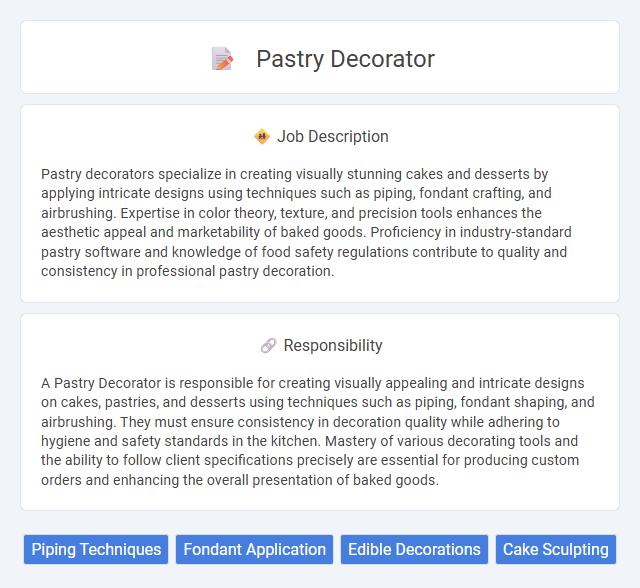
Pastry decorators specialize in creating visually stunning cakes and desserts by applying intricate designs using techniques such as piping, fondant crafting, and airbrushing. Expertise in color theory, texture, and precision tools enhances the aesthetic appeal and marketability of baked goods. Proficiency in industry-standard pastry software and knowledge of food safety regulations contribute to quality and consistency in professional pastry decoration.
Individuals with a keen eye for detail and a steady hand are likely to excel as pastry decorators, as precision and creativity are essential in this role. Those who enjoy working in fast-paced environments and can handle repetitive tasks might find this job suitable, while people sensitive to high pressure or requiring less physical activity may struggle. Passion for baking and artistic flair probably increase the chances of success and job satisfaction in this field.
Qualification
A Pastry Decorator must possess expert skills in cake design, including proficiency with fondant, buttercream, piping techniques, and edible decorations. Strong artistic ability combined with knowledge of food safety standards and ingredient properties is essential for creating visually appealing and safe desserts. Experience in a commercial bakery or pastry environment and a certification in culinary arts or pastry arts significantly enhance qualification credibility.
Responsibility
A Pastry Decorator is responsible for creating visually appealing and intricate designs on cakes, pastries, and desserts using techniques such as piping, fondant shaping, and airbrushing. They must ensure consistency in decoration quality while adhering to hygiene and safety standards in the kitchen. Mastery of various decorating tools and the ability to follow client specifications precisely are essential for producing custom orders and enhancing the overall presentation of baked goods.
Benefit
A Pastry Decorator job likely offers creative satisfaction through the artful presentation of desserts, enhancing culinary appeal. There is probable potential for skill development in cake decorating techniques and pastry design, which can advance career opportunities. The role may provide a collaborative work environment with chances to participate in special events and seasonal projects, enriching professional experience.
Challenge
Pastry decorator roles likely involve the challenge of creating visually appealing designs that meet both aesthetic standards and client expectations. The job probably demands precision, creativity, and the ability to work efficiently under time constraints to ensure pastries retain their quality. Handling intricate details and adapting to various styles might be common challenges faced in this position.
Career Advancement
Pastry decorators with advanced skills in chocolate work, sugar art, and cake design can progress into specialized roles such as lead decorator, pastry chef, or bakery manager. Gaining certifications in culinary arts and mastering software for custom cake design enhances career prospects and opportunities for higher pay. Experienced decorators often transition into entrepreneurship by opening boutique bakeries or offering custom cake services.
Key Terms
Piping Techniques
Pastry Decorators specialize in advanced piping techniques that enhance the visual appeal of cakes, cupcakes, and pastries by creating intricate designs with buttercream, royal icing, and fondant. Mastery in using various piping tips and nozzles allows for precise execution of borders, flowers, and textured patterns, ensuring consistent and professional results. Expertise in maintaining icing consistency and controlling pressure during piping directly impacts the quality and aesthetics of the final confectionery product.
Fondant Application
Expertise in fondant application is crucial for a Pastry Decorator, ensuring smooth, flawless finishes on cakes and pastries. Proficiency in rolling, draping, and trimming fondant enhances visual appeal and consistency in bakery products. Mastery of this technique contributes significantly to producing high-quality, professional-grade decorative desserts.
Edible Decorations
Pastry decorators specializing in edible decorations transform cakes and desserts using techniques like fondant modeling, sugar art, and chocolate sculpting to create visually stunning and intricate designs. Mastery in working with materials such as royal icing, edible glitter, and food coloring is essential to achieve precision and enhance the overall presentation. This role demands creativity, attention to detail, and knowledge of food safety standards to ensure decorations are both beautiful and safe for consumption.
Cake Sculpting
A Pastry Decorator specializing in cake sculpting expertly transforms cakes into intricate, three-dimensional edible art using fondant, modeling chocolate, and other sculpting mediums. Mastery of tools such as carving knives and silicone molds enables precise shaping and detailed design, enhancing both visual appeal and structural stability. Expertise in color blending, texturing techniques, and creative themes is essential to meet custom client requests and seasonal trends.
 kuljobs.com
kuljobs.com